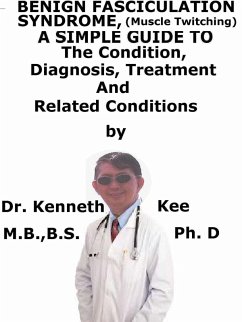A few days ago I have a new patient who has been having muscle twitching of the back muscles in the afternoon when resting after a busy day of housework.
This disorder began about ten years ago.
She did not have a history of trauma or frightening experience which may have sparked off the attack.
She had seen a neurologist who did an electro-encephalogram (EEG) and tested her and said that she was normal.
She also seen several doctors who had done blood tests and said she was normal especially the thyroid.
No MRI or CT scan of brain or spine was done.
She told me that the muscle twitching starts only when rested after a busy day of household work and not while she was working.
Apparently the muscle twitching has spread to her upper and lower abdomen.
There were no urological or gastrointestinal symptoms or sign.
Her blood pressure and heart rate were within normal.
There was no evidence of thyroid enlargement or thyroid symptoms.
There were fine tremors of the hands.
Recently she has taken up Yoga and Tai Chi which did not help.
However, deep breathing exercises help her twitching and muscle pain.
This seems to suggest that her condition may be caused by anxiety.
I decided to give her a mild tranquillizer twice a day and a muscle relaxant at night.
I also asked her to do deep breathing exercises to reduce anxiety or listen to soothing music.
Benign fasciculation syndrome (BFS) is persistent muscle twitching, tingling, or numbness in one or more muscles.
People with benign fasciculation syndrome may feel a persistent twitch or numbness in their muscles.
BFS causes extended muscle twitching, which can persist for extended periods of time or return regularly.
The twitches may happen in random muscles and may get better or worse with time.
Causes:
Fasciculations themselves can have a variety of causes, such as the use of certain substances or medicines, particularly allergy drugs.
Drugs that may trigger fasciculations are:
1.Beta-agonists
2.Chlorpheniramine (Chlorphen SR)
3.Dimenhydrinate (Dramamine)
4.Diphenhydramine (Benadryl
These twitches will normally subside when the person stops taking the medicine and do not cause BFS.
Muscle twitches may also be because of previous trauma and injury or may be symptoms of anxiety or depression.
Some people who lack certain minerals, such as magnesium or calcium, may also form muscle twitches
Fasciculations may also be linked to other regular activities such as:
1.Strenuous exercise
2.Drinking alcohol
3.Smoking cigarettes
4.Fatigue
5.Caffeine intake
Symptoms
The most frequent symptom of benign fasciculation syndrome is twitching in the thigh or calf.
The twitch will be most obvious when the body is at rest.
After some time, a person may also feel pain in the affected muscle.
Diagnosis
When diagnosing BFS, doctors will look for stress levels, muscle strength and resistance tests.
1.Blood tests to look for disorders with electrolytes, thyroid gland function, and blood chemistry
2.CT or MRI scan of the spine or brain
3.Electromyogram (EMG)
4.Nerve conduction studies
Treatment
No treatment is required for benign muscle twitching in most cases.
In other cases, treating an underlying medical cause may improve the symptoms.
Anxiety may be reduced by listening to soothing music and deep breathing exercises.
Sometimes a mild tranquillizer may help.
The patient should eat well.
Anti-inflammatory drugs or muscle relaxants may help people with pain, fatigue, and inflammation.
If blood work identifies any mineral deficiency, the person should take magnesium or calcium.
TABLE OF CONTENT
In...
Dieser Download kann aus rechtlichen Gründen nur mit Rechnungsadresse in A, B, CY, CZ, D, DK, EW, E, FIN, F, GR, H, IRL, I, LT, L, LR, M, NL, PL, P, R, S, SLO, SK ausgeliefert werden.


